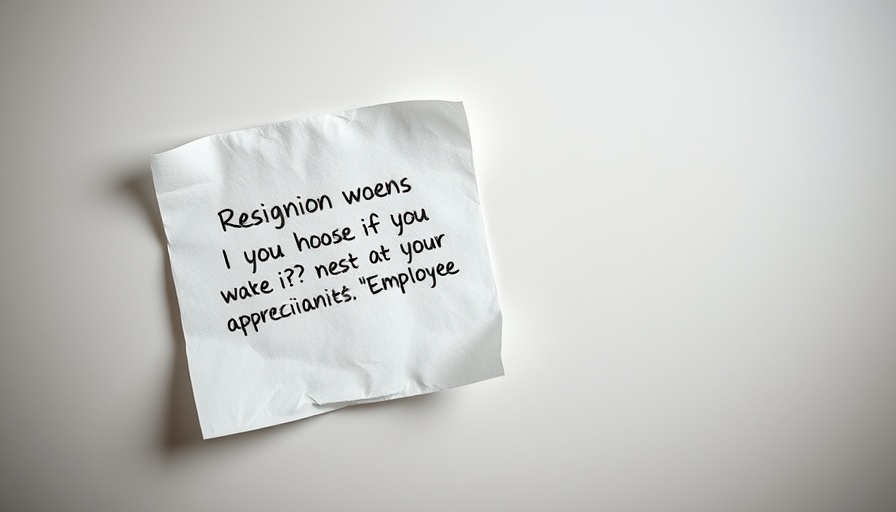
The Toilet Paper Resignation Letter: A Symbol of Workplace Disrespect
The most recent viral sensation on social media is a resignation letter written on toilet paper, shared by Singapore-based entrepreneur Angela Yeoh. The anonymous employee who penned the letter stated, "I have chosen this type of paper for my resignation as a symbol of how this company has treated me. I quit." This simple but powerful message highlights the growing frustrations many workers feel in their workplaces, where they feel more like disposable tools rather than valued contributors.
Understanding the Impact of Toxic Work Environments
This poignant act serves as a reminder that toxic work cultures often lead to employees feeling undervalued. The impact of such environments goes beyond just higher turnover rates; they can significantly affect mental health and productivity. Research indicates that when workers don’t feel recognized, their overall engagement drops by more than 80%. Angela Yeoh's interpretation—that an employee feels like "toilet paper—used when needed, then discarded"—vividly reflects these sentiments.
Emphasizing the Need for Employee Appreciation
Yeoh's advocacy for a change in workplace culture emphasizes that employee appreciation isn't merely a retention strategy; it’s an essential cornerstone of respect and dignity. According to her, company cultures that fail to make employees feel appreciated are paving the way for resentment and disengagement. Yeoh encourages employers to create environments where employees depart with gratitude rather than bitterness. This approach fosters loyalty and a healthier workplace dynamic.
Real-World Examples of Toxic Workplaces
Unfortunately, the feelings expressed in this resignation letter are not isolated. Many employees around the globe have shared similar experiences. The rise of the “quiet quitting” trend and the “Great Resignation” phenomenon is indicative of a seismic shift in employee expectations. Employees today are more aware of their worth and are less likely to endure mistreatment in silence. Highlighting experiences from various corporate environments, numerous reports reveal that many workers have been subjected to overwork, lack of support, and stress without the courtesy of recognition.
Actions Companies Can Take to Foster a Positive Culture
So, what can businesses do to alleviate this epidemic of workplace toxicity? Simple changes can make a significant impact. Organizations are encouraged to implement programs that promote recognition, such as employee awards or acknowledgment meetings, and provide mental health support services. Small gestures, such as thank-you notes or public acknowledgment of an employee's hard work, can go a long way in creating a culture of appreciation.
A Call to Action: Strengthening Employee Well-Being
For leaders and managers, the viral resignation letter underscores a critical pivot point in how they perceive and engage with staff. Yeoh’s insights lead us to understand that recognizing individuals as valued team members is essential for contemporary workforce management. By ensuring that employees feel appreciated and supported, companies can make transformative strides toward a more inclusive workplace. As Yeoh put it, "Small changes in appreciation make a big impact. Start today." This message calls for introspection and action among employers to reassess and change the way they interact with their teams.
Conclusion: The Future of Work Should Prioritize Human Connection
The toilet paper resignation letter has become more than a viral moment; it reflects the urgent need for addressing workplace cultures that fail to prioritize employee dignity. The trajectory of the future workplace hinges significantly on how employers choose to treat their employees today. Cultivating an atmosphere of respect and appreciation is not just about retaining staff; it’s about enhancing overall productivity, mental health, and the fulfillment of every member of the organization. As we move forward, let’s champion workplaces where every employee is treated with the respect they deserve, fostering environments filled with gratitude rather than resentment.
 Add Row
Add Row  Add
Add 




 Add Row
Add Row  Add
Add 

Write A Comment